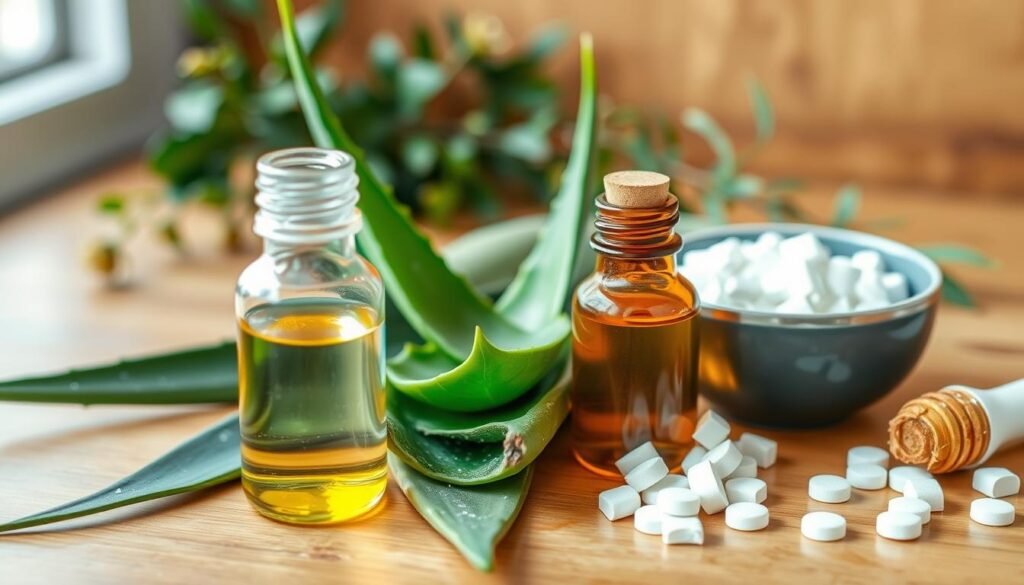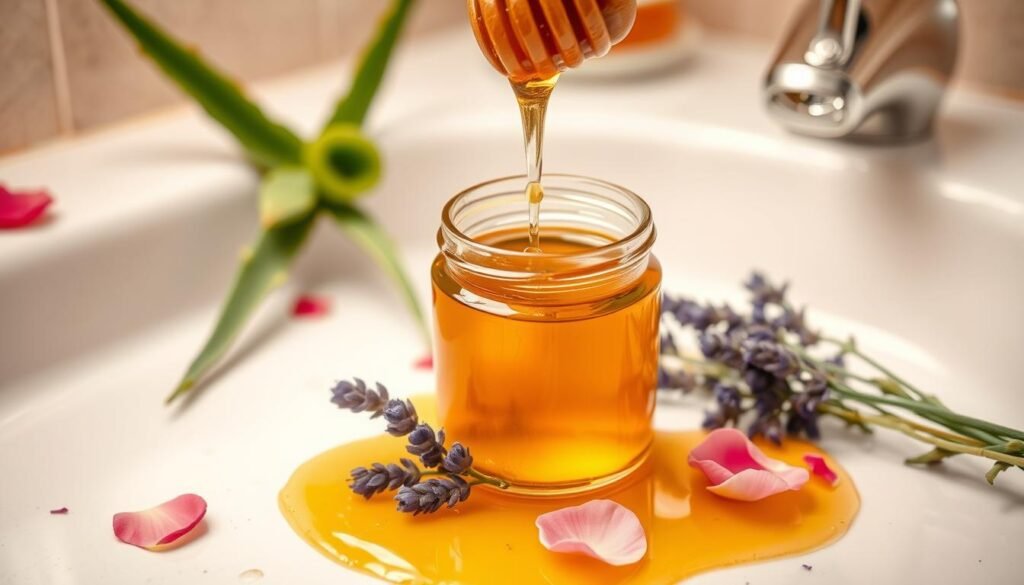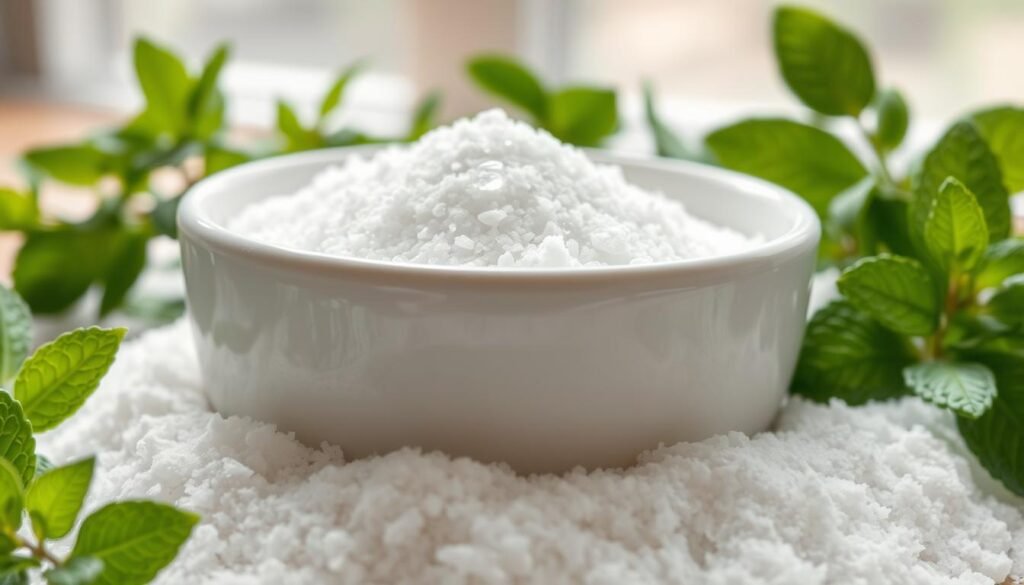Did you know that 85 percent of young adults are affected by acne? It’s one of the top skin issues around the globe. Many people are now looking for natural ways to treat it. A study found that 77 percent of those with acne have tried natural remedies. This shows a big interest in safer, easy-to-use skin care methods.
We’ll look at 4 home remedies for pimples in this piece. They’re not just simple but also kind to your wallet. Tea tree oil, with its germ-fighting powers, and aloe vera, known for its calming effect, are great options. Honey and baking soda also come in handy in fighting acne.
Our goal is to offer solutions that easily blend into your skincare habits. These natural fixes are geared towards giving you clearer, healthier skin without worries. For more on acne’s science and different treatments, see this insightful article.
Key Takeaways
- Acne is extremely common, affecting a vast majority of young adults.
- Natural remedies are gaining popularity as alternative acne treatments.
- Tea tree oil can reduce acne symptoms without the irritation seen in some traditional treatments.
- Honey, aloe vera, and baking soda are also seen as effective for clearer skin.
- Adding these remedies to a regular skincare routine can lead to healthier skin.
Understanding Pimples and Acne
Acne affects about 9.4% of people all over the world. It’s the top skin problem in the U.S., says the American Academy of Dermatology. Knowing how acne forms is key in skin care education and tackling different pimple types.
Acne starts when hair follicles get blocked by oil and dead skin. This leads to swelling and bacteria growth. We see different pimple types like:
- Whiteheads: clogged pores that are closed under the skin’s surface
- Blackheads: open pores that contain oxidized sebum and appear dark
- Cysts: painful, pus-filled lumps beneath the skin’s surface
It’s important to know these acne symptoms to treat acne well. Factors like hormones, certain meds, and diet matter a lot. Foods with a high glycemic index or some dairy products might make acne worse.
For tough acne, doctors may suggest pills or creams to ease swelling and kill bacteria. Sometimes, treatments like chemical peels or photodynamic therapy are used to avoid scars. Understanding all this helps in better skin care and less acne.
| Pimple Type | Description | Treatment Options |
|---|---|---|
| Whiteheads | Clogged pores beneath the skin | Topical retinoids, salicylic acid |
| Blackheads | Open clogged pores that oxidize | Exfoliants, benzoyl peroxide |
| Cysts | Painful lumps filled with pus | Oral antibiotics, corticosteroid injections |
What Causes Acne and Pimples
To treat acne well, it helps to know what causes it. Hormonal changes are a big deal here. These changes happen during puberty and menstruation. They make the skin produce more oil, which can block pores and cause pimples.
Your family history matters too. If your parents had acne, you might get it as well. Certain medications like corticosteroids and hormonal contraceptives also play a role. They can lead to acne as a side effect.
What you eat might affect your skin too. Though experts are still studying this, eating less greasy food might help. Good skincare habits are important. Make sure to wash your face twice a day and use products that don’t clog pores.
Stress can also cause acne, but we don’t know exactly how. Additionally, some hair products and skin irritants in the environment can make acne worse.
If you want more info on how to manage acne, check out these acne treatments. They can offer helpful tips.
Home Remedies for Pimples
Looking for home remedies is smart. It lets us treat pimples naturally. These remedies balance skin oils, lower inflammation, and beat bacteria without strong chemicals.
Many folks use apple cider vinegar diluted with water. It has antibacterial qualities. Likewise, honey is a strong antibacterial, especially medical-grade types like manuka honey.
For swift relief, placing ice on pimples can lessen inflammation well. Mixing ice with hydrocortisone cream makes healing faster. Using products like avocado oil, rich in vitamins A, C, D, E, and fats, helps dry skin.
Gentle exfoliation fights acne well. Products with colloidal oatmeal calm skin while quinoa gently scrubs. Using these regularly usually brings good results.
Eating well helps a lot in treating pimples. Staying away from sugar and dairy reduces inflammation and bacteria. Creating these healthy habits can make skin clearer and fit your skincare routine.
| Home Remedy | Benefits | Usage |
|---|---|---|
| Apple Cider Vinegar | Antibacterial, mild exfoliation | Dilute with water, apply as toner |
| Honey | Antibacterial, moisturizing | Apply directly or mix into masks |
| Ice | Reduces inflammation | Apply directly on pimple |
| Avocado Oil | Hydrates dry skin | Use in skincare products or as a moisturizer |
4 Home Remedies for Pimples
Finding good acne home remedies is key for those facing breakouts. Natural ingredients can really help fight acne and support healthy skin. Tea Tree Oil, Honey, Aloe Vera, and Baking Soda are all great in this fight.
Tea Tree Oil: A Natural Antibacterial
Tea Tree Oil is celebrated for its antibacterial and anti-inflammatory qualities. A 5% tea tree oil gel can notably lessen acne. It works as well as many over-the-counter options, so many prefer it for their skincare.
Honey: Nature’s Antiseptic
Manuka honey stands out for its very strong antibacterial power. It’s much more effective against acne bacteria than other honeys. It also soothes skin and helps with healing. It’s a top pick for acne home remedies.
Aloe Vera: Soothing and Healing
Aloe Vera cools and hydrates the skin. It makes other treatments like tretinoin work better for mild to moderate acne. It reduces redness and irritation, helping clear the skin.
Baking Soda: The Gentle Exfoliant
Baking Soda is a soft exfoliant that unclogs pores and balances pH. But, use it sparingly to avoid dry skin. It’s useful for natural skincare routines when used carefully.

Using Tea Tree Oil Effectively
Tea tree oil is known for helping with acne. People use it for its natural antibacterial properties before trying professional treatments. Studies say applying it twice daily can improve mild acne. A study in Clinical Microbiology Reviews noted it also fights inflammation, helping with severe acne types.
To use tea tree oil for acne, mix it correctly. Blend the oil with a carrier oil or moisturizer to avoid irritation. A common mix is one part tea tree oil to nine parts carrier oil. This mixture helps enjoy its benefits while reducing the risk of side effects.
- Tea tree oil blends well with natural remedies such as:
- Clay masks
- Facial scrubs
- Overnight masks with aloe vera and coconut oil
Studies have shown significant acne reduction with tea tree oil. In 2007, a 5% tea tree oil solution outperformed a placebo. Users noticed clearer skin after 12 weeks of regular use.
However, it’s important to know tea tree oil might cause skin irritation or contact dermatitis. Symptoms include redness and itching. It’s wise to do a patch test before using it fully.
While tea tree oil has its pros, it’s not as potent as some acne meds. It’s great for spot treatments but not as a standalone acne solution. Results can take up to three months. Pregnant or breastfeeding persons should be cautious, as its safety then is unknown.
The Benefits of Honey for Skin Care
Honey is known for its outstanding benefits in skincare. It has natural antiseptic properties for treating acne and calming the skin. Honey’s antibacterial traits help to ease inflammation and the redness acne brings. It is a favored choice for various skin care formulas.
How to Make a Honey Mask
Making a honey mask is straightforward and beneficial for your skin care routine. Here’s an easy honey mask recipe to enhance your skin.
- Gather the ingredients: 2 tablespoons of raw honey and 1 teaspoon of cinnamon.
- Mix the honey and cinnamon in a bowl until it forms a smooth paste.
- Cleanse the face and apply the mixture evenly, avoiding the eyes.
- Leave the mask on for 15-20 minutes.
- Rinse off with lukewarm water and pat the skin dry.
Use the honey mask once or twice a week to manage acne. Honey and cinnamon’s natural antiseptic properties fight skin bacteria. Consistent use leads to clearer, glowing skin.

Aloe Vera for Acne Treatment
Aloe vera is popular for solving skin problems, including acne. It’s full of aloe vera benefits, moisturizing, healing, and lowering inflammation. Using aloe vera for acne fights acne bacteria with its antibacterial traits. This makes it perfect for natural skin care.
Ways to Use Aloe Vera
Aloe vera can ease acne when added to your skincare. Here are a few good ways to use it:
- Direct Application: Apply fresh aloe vera gel directly to your skin. It’s easily absorbed, hydrates, and battles bacteria.
- Aloe Vera and Lemon Juice Mask: For a cleansing mask, mix aloe vera gel with lemon juice in an 8 to 1 ratio. Lemon juice’s fruit acids and aloe vera’s benefits work well together.
- Coconut Oil Scrub: Mix coconut oil with aloe vera and sugar for a soft scrub. This combo helps exfoliate the skin, possibly improving acne.
- Aloe Vera Spray: Make a hydrating spray with water and aloe vera gel in a 2:1 ratio. It’s perfect for keeping skin moist without making it oily, ideal for acne sufferers.
Adding aloe vera to your skincare is great. Mixing it with honey or tea tree oil boosts antibacterial power. Always test on a small skin area first to prevent any unwanted reactions.
Using natural skin treatments like aloe vera works, but don’t overdo it. Watching how your skin reacts will help you get the most from this amazing plant.
| Method | Benefits | Usage Frequency |
|---|---|---|
| Direct Application | Hydration and antibacterial properties | As needed |
| Aloe Vera and Lemon Juice Mask | Effective cleansing and soothing | 1-2 times a week |
| Coconut Oil Scrub | Exfoliation and added moisture | 1-2 times a week |
| Aloe Vera Spray | Hydration without excess oil | Daily |
How Baking Soda Helps with Pimples
Baking soda is known for its great exfoliating properties. These may help cut down on acne. Its anti-inflammatory and antiseptic traits can ease skin pain and reduce swelling. Nevertheless, be cautious with baking soda due to its high alkaline pH level of 9.
The pH of baking soda is above the skin’s natural range, which is between 4.5 and 5.5. This mismatch can remove vital oils, leaving the skin very dry. It could even make acne breakouts worse. Using baking soda for too long might irritate the skin and make it more sensitive to sunlight.
While some people see benefits, skin doctors usually don’t suggest using baking soda for acne. They often recommend other options like apple cider vinegar and tea tree oil. Eating fewer refined sugars and cutting out dairy may help too. For fighting pimples, products with benzoyl peroxide are a top choice.
It’s not wise to use baking soda alone because it could irritate your skin. Mixing it with lemon juice is also bad as it can damage the skin’s barrier. Experts advise using tested and regulated products instead of homemade mixtures. These can give safer results.
| Aspect | Baking Soda | Alternatives |
|---|---|---|
| pH Level | 9 (alkaline) | Apple Cider Vinegar (acidity balanced) |
| Exfoliating Properties | Yes | Tea Tree Oil (gentler option) |
| Possible Side Effects | Dryness, irritation | Minimal with proper use |
| Professional Recommendation | Not generally recommended | Preferred for acne treatment |

Additional Natural Remedies to Consider
Looking at natural ways to treat acne offers many options. Some well-liked alternative acne treatments include ingredients beneficial for skin health.
Green tea is famous for its antioxidants. It works well when applied to the skin. It reduces swelling and limits oil production. Using it as a mist or in masks can amplify its benefits.
Apple cider vinegar is a top choice for skin care. It has acids that remove dead skin and are good in controlling breakouts. As a toner, it’s great for those with acne when mixed with water.
Zinc can be used on the skin or taken as a pill. It helps balance hormones, reduce swelling, and control oil. Studies show that zinc can reduce the number of future acne outbreaks.
To get the most out of these natural methods, be mindful. Not everything works the same for everyone. For more about home acne remedies, see the full list here.
| Remedy | Application | Benefits |
|---|---|---|
| Green Tea | Topical application | Reduces inflammation and sebum production |
| Apple Cider Vinegar | Skincare toner | Exfoliates skin and controls outbreaks |
| Zinc | Supplement or topical cream | Balances hormones and reduces inflammation |
| Tea Tree Oil | Spot treatment | A natural antibacterial, helps target acne spots |
| Aloe Vera | Applied twice daily | Soothes skin and prevents lesions |
Conclusion
The article talks about how important natural treatments are in fighting acne. Tea tree oil, honey, and aloe vera can really help make pimples less of a problem. These remedies work well because they fight bacteria, bring down swelling, and help skin heal faster.
When trying to clear up acne, it’s vital to look at your whole lifestyle. This includes what you eat, how much stress you have, and how well you sleep. Taking care of your skin, eating right, and getting advice from experts can really make a difference. If acne won’t go away or is really bad, a dermatologist can create a special plan just for you.
Home remedies are just one piece of a larger puzzle in keeping your skin healthy. It’s just as crucial to live a healthy life, which means staying active and drinking plenty of water. Understanding how everything in your life affects your skin can help you achieve clearer skin and feel better about yourself.